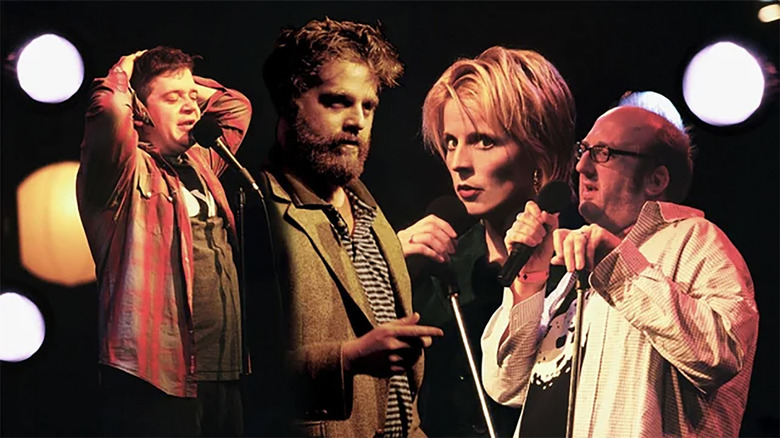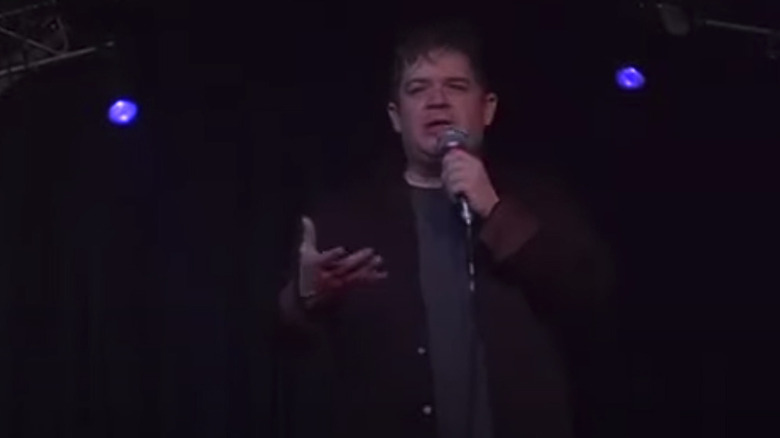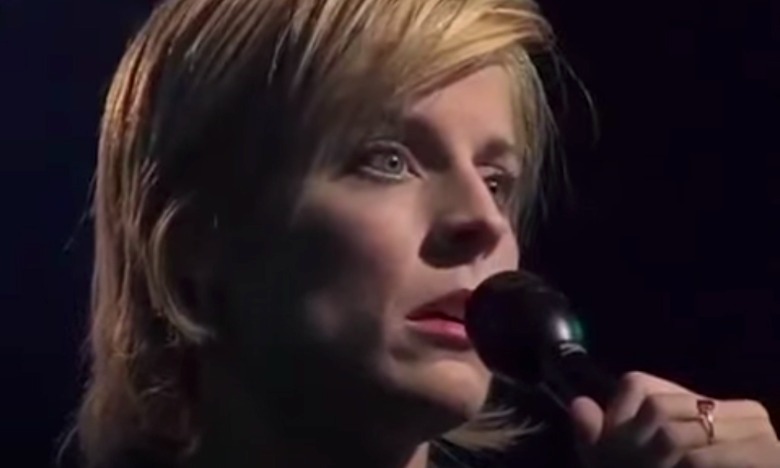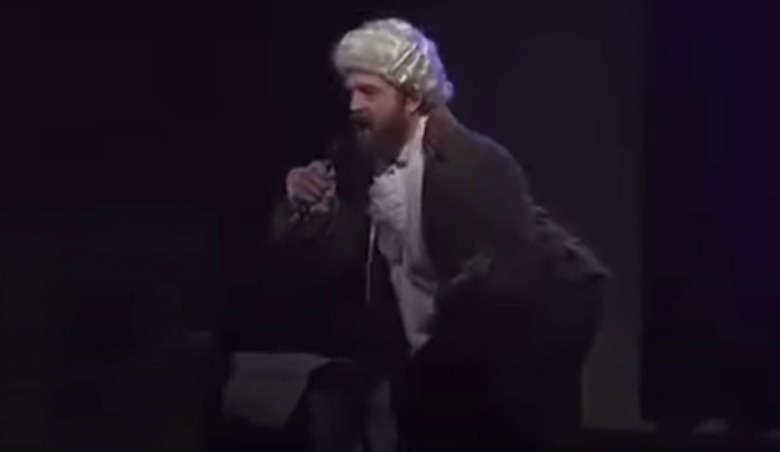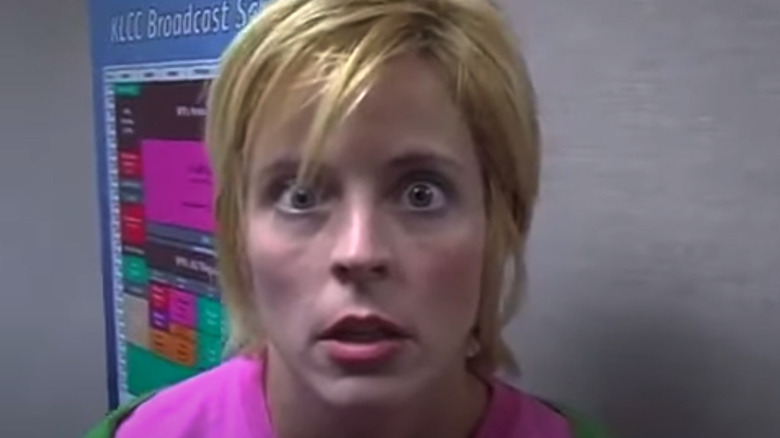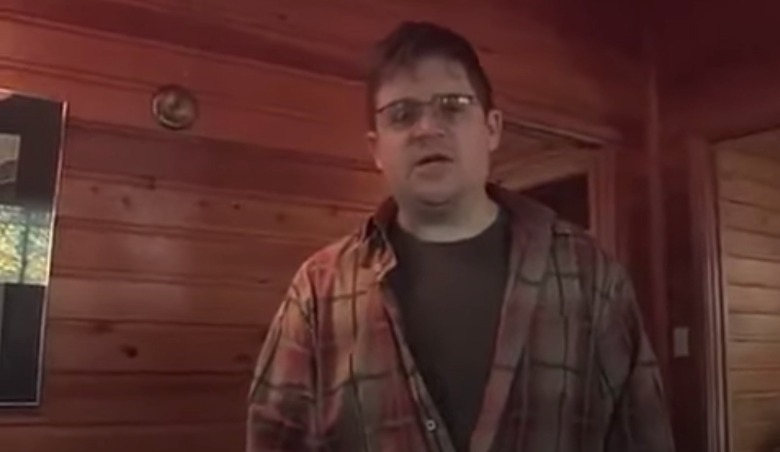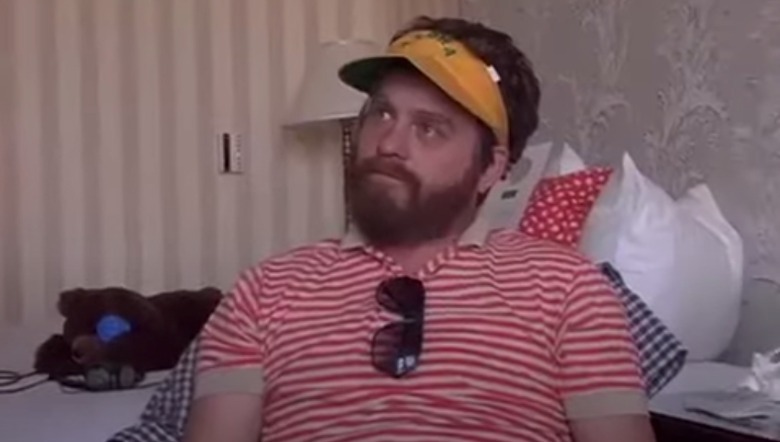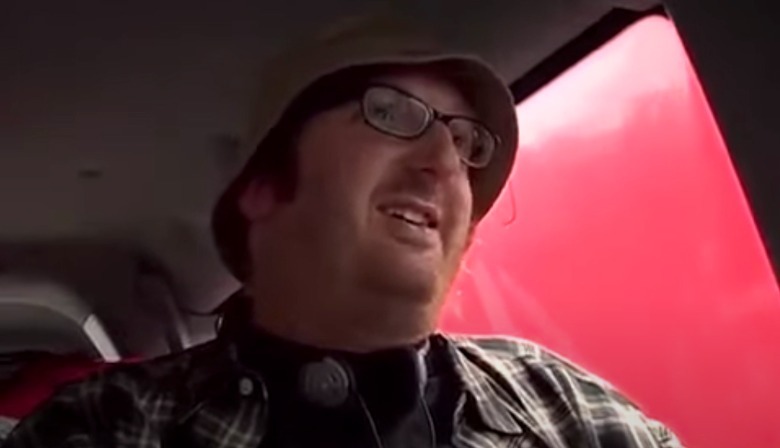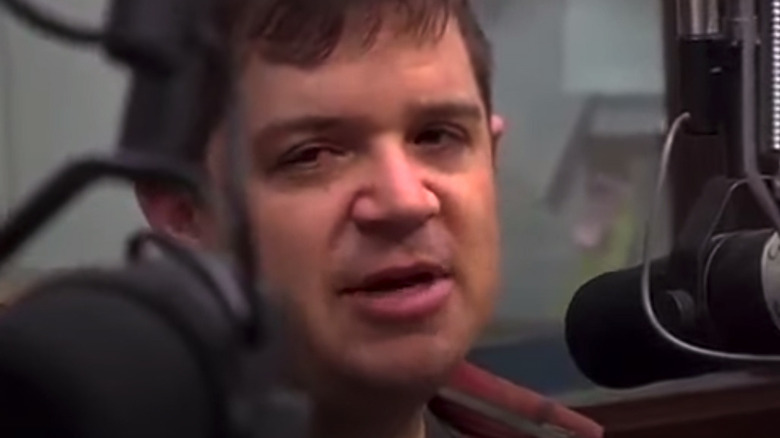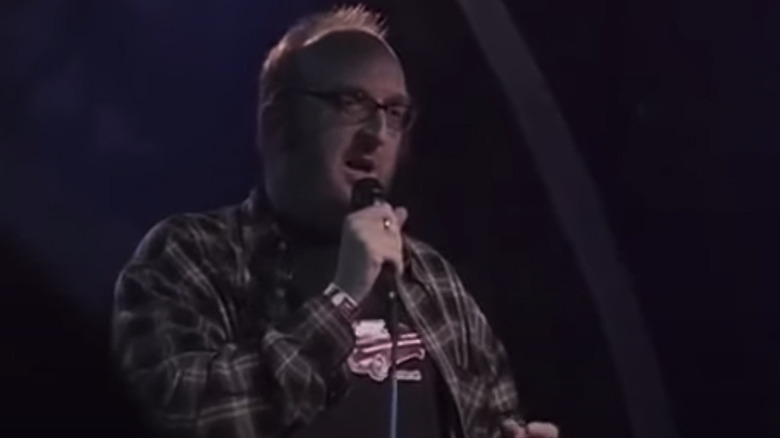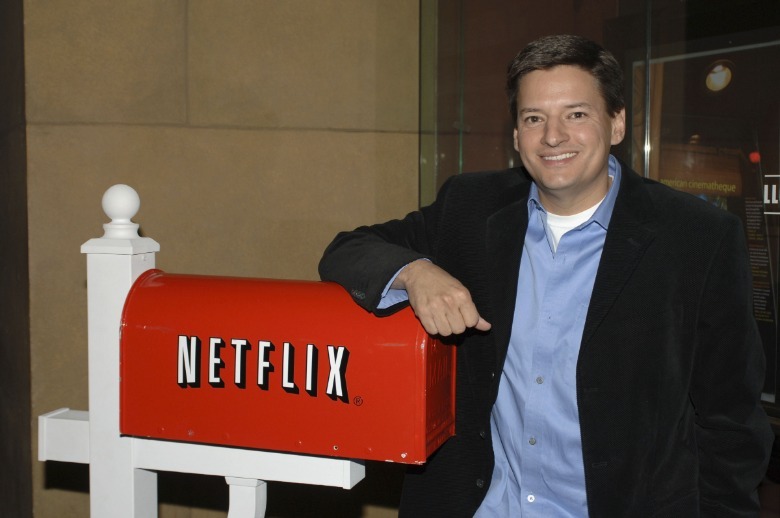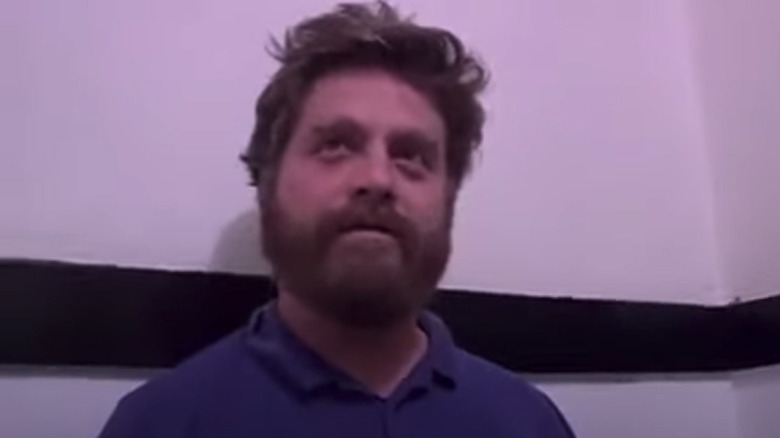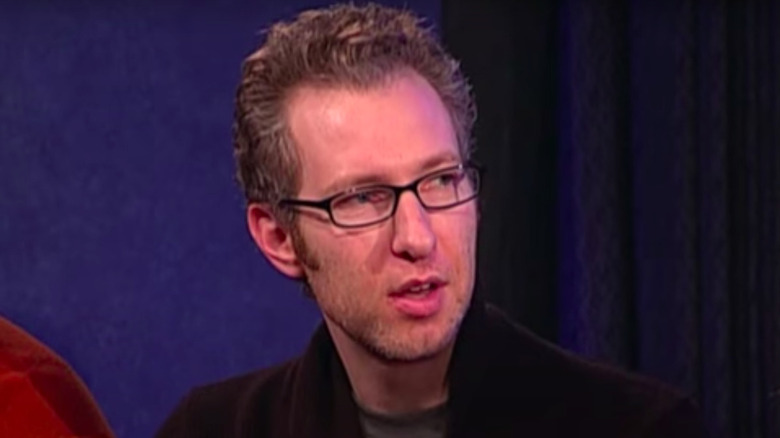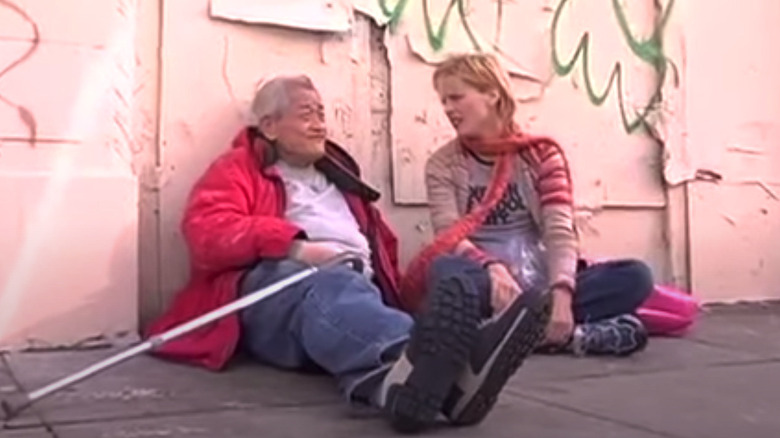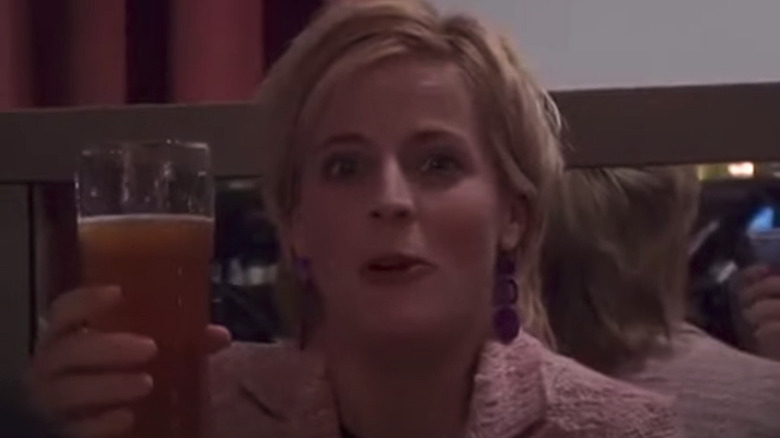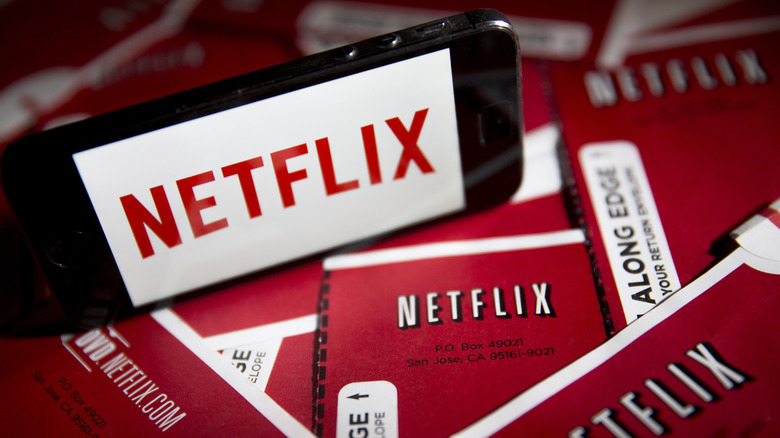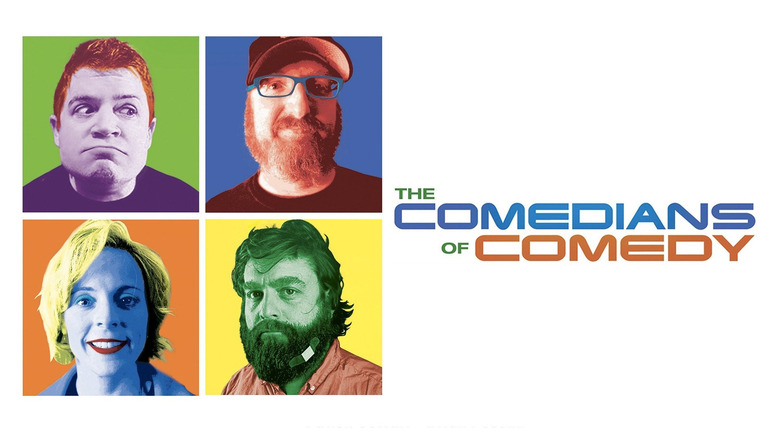Remembering The Comedians Of Comedy, Netflix's First True Original Production (A Quasi-Oral History)
If I asked you to name the first original production from Netflix, what would you say? An educated guess might bring you to "House of Cards" or "Lilyhammer," and that's a fair assessment. While the former was Netflix's first piece of original programming produced specifically for the company's streaming service (released in February of 2013), the latter technically has the honor of being Netflix's first original streaming production (premiering on Netflix in February of 2012), even though it was only partially funded by Netflix and actually premiered in Norway first under the TV network NRK1.
But what if I told you that neither of these was the first true Netflix original? What if I told you Netflix produced their first original production even before they created the now-defunct Red Envelope Entertainment? Yes, before streaming, Netflix had a film financing and acquisition arm that shuttered in 2008 after investing in more than 100 films and partnering in key acquisitions for small distributors, bringing us movies like "Trumbo" starring Bryan Cranston, "2 Days in Paris" with Julie Delpy, and the documentary "This Film Is Not Yet Rated" about the hypocrisy of the Motion Picture Association of America. But before Red Envelope Entertainment was formed, in 2005, Netflix presented "The Comedians of Comedy."
Named as a riff on the theatrically released stand-up comedy concert "The Original Kings of Comedy," which featured the comedy routines of Steve Harvey, D.L. Hughley, Cedric the Entertainer, and the late Bernie Mac, "The Comedians of Comedy" was both an American comedy tour and a documentary that found comics Patton Oswalt, Brian Posehn, Maria Bamford, and Zach Galifianakis embarking on a string of stand-up comedy shows that stepped outside of the traditional comedy club circuit. Instead, the Comedians of Comedy stopped at indie rock venues, an idea that comedian Neil Hamburger has been credited with pioneering — venues that didn't come with the stuffier attitudes of the more highfalutin, overpriced, brick-walled comedy clubs with two-drink minimums.
Last week, Netflix officially ended their DVD mail service. Leading up to this moment, I figured there was no better time to look back at what was actually Netflix's first original production. After premiering at the South by Southwest Film Festival in March 2005, followed by a theatrical premiere in Los Angeles in November later that same year, eventually the documentary was released on DVD and sent to my own mailbox by Netflix when I was still in college. And that's exactly how I discovered the hilarity captured on low quality digital video.
Over the past month and a half, I've spoken with comedians Patton Oswalt and Maria Bamford, the film's director Michael Blieden, and producer/talent manager Dave Rath about how the "Comedians of Comedy" came to be and their memories looking back at the stand-up comedy tour. If you loved the antics of "The Comedians of Comedy" as much as I do, just keep reading.
The stand-up
Though Oswalt and Posehn had found success as supporting cast members of the network sitcoms "The King of Queens" and "Just Shoot Me," respectively, they had yet to become the household names in stand-up comedy they are today. Galifianakis was in a similar boat, as part of the cast of the Fox series "Tru Calling," but he was still a few years away from the massive fame that awaited him after "The Hangover." As for Bamford, this would serve as a launchpad for an even more lucrative career in stand-up, though she had already found success as a voiceover actor, bringing to life a variety of characters across the entire run of the Nickelodeon animated series "CatDog" (and she's done infinitely more voice work since then). Basically, we're seeing these comedians as they're on the cusp of greatness.
As such, at this time, the Comedians of the Comedy was aiming for crowds that were hungry for jokes that were maybe a little more rough around the edges, an audience who wanted bits that didn't follow a late night talk show or sitcom punchline formula, people willing to listen to hilarious diatribes that leaned into obscure references or niche fandoms. And they found them. This was a key part of the next evolution of the alternative comedy scene that rose up in the United States around the mid '90s, thanks to names like Sarah Silverman, Dana Gould, Janeane Garofalo, and Todd Barry, just to name a few.
In "The Comedians of Comedy," we see snippets of stand-up sets from Oswalt, Posehn, Bamford, and Galifianakis. These aren't the kind of polished bits that you're used to seeing in their award-winning stand-up specials, many of which you can find streaming on Netflix. All of the comedians are playing a little more fast and loose with their material, trying out rough jokes, casually interacting the crowd, and even creating entire gags that they've never done before.
Oswalt spends some time taking jabs at George W. Bush and Republicans, comparing the affinity for them to giving fellatio to Michael Damian at the county fair, a topic that partially inspired him to turn away from the comedy club crowd (more on that later). But he also digs into comparing comic book collecting to scoring drugs and other assorted geeky aspersions he's known to seamlessly weave into his observations and anecdotes. Veering away from the political stuff, Posehn discusses being then-recently married and having a new puppy, as well as a supremely disappointing encounter with the metal band W.A.S.P. when he was just 15 years old, and his fading "Star Wars" fandom.
Meanwhile, Bamford riffs on Karens at Target and coffee shops, long before the now-besmirched name would become synonymous with needing a manager, as well as the thoroughly disappointing mundanity of office work; she's often using the stark contrast between her unique voice and a variety of takes on what she's "supposed to sound like" to maximize her hilarious set-ups.
And finally, Galifianakis brings the more absurd, off-the-wall energy, never hesitating to try something new by playing with the format of stand-up comedy. Though he does some of his trademark Mitch Hedberg-esque one-liners while playing the piano, he also pretends to be a comedian named Nathanial Buckner from 1778, beginning with, "Thank ye, thank ye, good to be hither," and asking "Am I the only one tired of this Ben Franklin mother****er?" The comedian also uses a pair of aged street performers he met one afternoon to sing as a cap to one of his sets.
The tour
In between stand-up sets, there's raw, candid footage of the comics traveling in an RV and rented vans, messing around in hotel rooms with the help of the doc's small crew, stopping by diners, comic shops, and arcades, promoting the tour on insufferable morning radio shows, and much more. It's here that "The Comedians of Comedy" documentary stands out more than any other documentary following comedians, because it captures that chaotic, wild, and purely fun energy that comics have when they're hanging out with each other. As director Michael Blieden recalled:
"What we talked about was creating this empty space that the comedians then would then fill with their comedy as we travel from place to place. I'd been watching so many really good fly on the wall documentaries at the time. It was the famous Bob Dylan one, it's black and white. I just watched it over and over again. [...] "Don't Look Back." We just wanted to emulate that and give the comics a real opportunity to fill that space with their material. Because, look, all comics want to do is be funny. It's not like they're going to ever stop trying to think of something funny to say. That's what they do, so you have to just be ready."
In the film, the comedians basically crafted their own shenanigans with the small camera crew. No, there's not a lot of production quality here, either. It's full frame, there's no professional lighting or flawless sound, and it's shot handheld, guerrilla style. But for me, that was always part of its charm, especially since it puts the focus on spending time with these comedians.
One set-up finds Oswalt pretending that he'd kidnapped someone, speaking directly to the camera as if it's his victim in a remote cabin somewhere, trying to stop them from leaving the premises. This bit continues for only a couple minutes, until Oswalt admittedly creeps himself out and Blieden laughs behind the camera. The filmmaker remembered:
"The whole time I'm thinking, 'This is so good. This is so good.' Because Patton loves movies, and if you're a cinephile, and you've seen every creepy horror movie, this is what you expect to happen in the woods."
Another hilarious segment has Galifianakis trying to play it straight to the camera, talking about avoiding slapstick comedy, only to have the leg of the chair he's sitting on intentionally broken, causing him to fall onto the ground outside of the same cabin. This is then followed by Oswalt and Posehn walking through the woods behind him, wearing only their socks and shoes and cupping their balls as they casually walk by. Posehn causes Galifianakis to break into laughter when he cheerfully departs the scene with, "Take'er easy!"
As you might expect, Bamford has the more tame moments of playfulness throughout the film, such as feigning reality show drama with fast-paced darting glances into three different cameras situated squarely in front of her face, but when it comes to the rest of the silliness, she was happy to only enjoy it later when she saw the movie:
"I didn't grow up with brothers, so it seemed delightful. It seemed fun that they were having a good time. I was very shy and anxious around people, so I was glad that I didn't have to be there during the camaraderie. There was no peer pressure for me to be there, so I was just surprised and enjoyed it, enjoyed the footage."
Of course, she couldn't help but bust up laughing when Galifianakis showed her some of his fanmail, which featured a nude man showing his more intimate parts, both from the front and the back, in what seemed like great detail. (The nudity is blurred in the movie.) Bamford is cracking up as she views these photos on Galifianakis' laptop. I asked whether there was any further explanation about that fanmail, and Bamford said:
"Somehow, I don't remember [Zach] knowing [where it came from], but there was a Brazilian man sending nudes. I think that's a different kind of honor, that people feel like they want to send you their furry parts. It was just surprising and it wasn't gross. It was well done."
Of course, it should be noted that there are stand-up bits and candid moments occasionally in the doc that haven't aged well over 20 years, because of all the welcome and necessary progress we've made on a societal and cultural level. So there are some casual drops of the R-word and some questionable references to homosexuality, but anyone who's a student of cinema can tell you that's par for the course when looking back at the media of the past, especially comedy.
All right, you've heard enough from me praising "The Comedians of Comedy" and all that it did to influence and advance the alternative comedy scene in the mid-2000s. It's time to hear from some of the people who made it happen. The movie and tour was successful enough that it would spark several other iterations with even more comedians jumping on board, such as David Cross, H. Jon Benjamin, Sarah Silverman, Andy Kindler, Morgan Murphy, Eugene Mirman, and Dana Gould. There was even a Comedy Central series adaptation that followed the film, as well as a special that was filmed at The Troubador in Los Angeles. But this is about that first small tour and the documentary that Netflix produced. What follows is a quasi-oral history of the creation of "The Comedians of Comedy" and that first tour, culled together from a series of my own Zoom conversations and phone calls.
The (oral) history
With nearly 20 years having passed since that original tour, I wanted to know the first thing everyone remembered about "The Comedians of Comedy." Unfortunately, we were unable to get in touch with Brian Posehn and Zach Galifianakis to take part in this story.
Patton Oswalt: Just getting to hang out with my friends, getting to hang out with comedians that, not only did I want to watch every night, I wanted to travel with and do stuff with. That was how comedy started for me, it was, "Oh, I'm getting to hang out with really funny people." So we were able to recreate that on the road.
Most of the best memories, you see them in the documentary. You see the moments of us all just kind of messing around in hotel rooms and goofing around. All those memories got captured on film, which is nice.
Some of the best comedy comes from comedians trying to fight boredom.
Maria Bamford: Gratitude that I got to be a part of it. It definitely helped me start working more regularly as a comedian, so just real gratefulness.
Michael Blieden (director): The thing I remember most about that mini tour, we were in a 15-passenger van, just the small crew, and there's a moment where Patton was doing a bit where he was sleeping. Not a great bit, but it's funny when Patton does it, the bit was he was asleep. Then Zach starts doing the bit. Patton took up a whole little row in the 15-pass, and Zach took up another row in the 15-pass. Patton was doing the bit, they couldn't see each other, but Patton's bit was that he was sleeping, I think, like a cute troll. I'm over the top of him, and then I pan over to Zach, and Zach was doing a different bit. Zach was sleeping with his mouth open, and I reached down like a director because in my mind, I want them to be doing the same bit.
I reached down, and you can see me, I touched his chin to close his mouth as my way of saying, "Do this same bit." But I closed his mouth, but like a toddler, he just opened it again, and in that moment, it was honestly the one moment that taught me how to make documentaries with comedians. I had to reset my expectations and let go of my agenda about what the bit was and realize I'm here to witness the bit that he wants to do. It's his bit.
The act of filming with comics is encouraging them and trying to craft a story, but also constantly, constantly, several times a minute sometimes, letting go of what you think is happening and let what's actually happening unfold. It's an interesting spiritual exercise.
You have to remember, in context, this is at the height of the prank show reality bubble in the early 2000s, and all of us, including the comics, had all been subjected to having to set up pranks, challenges, all these highly structured funny concepts. We all were very aware that what we wanted to do, because we're traveling — and I'm going on a whole monologue here — but because we were traveling with the show, and they had concerts to do every night, there is a narrative spine built into that format. You don't really have to add to it.
Dave Rath (producer/manager): All the memories blend together from the Netflix [doc], from the first one all the way through the one-off shows, Coachella, the Comedy Central series, it all kind of blends together for me. It's hard to separate it out.
How did The Comedians of Comedy come about, or how did you come to be involved with it?
Rath: It was a politically charged year. And [Patton] mentioned something, he did a joke about George [W.] Bush or something. He had hecklers. It turned bad, and he had never dealt with that before. So he is like, "I don't want to do comedy clubs anymore. This is not good for me. And we need to get to our fans somehow." But he and the whole alt [comedy] movement was still growing at that time, and it wasn't as mainstream as it became within a few years.
He and Posehn were just hanging out one day and they called me and said, "Hey, we just came up with an idea." We were saying, "Look, we need to figure something out. Maybe you guys can go out together and cull your audiences." And he goes, "We came up with an idea. We want to be the Comedians of Comedy, as opposed to the 'Kings of Comedy.'" That was really big at the time. And I said, "Maybe that could work." So we kind of put it together. We did a little show.
In the beginning of the film, there's footage with someone behind the camera (seemingly Blieden) talking to Oswalt about this nugget of an idea that would become the indie rock-style tour for "Comedians of Comedy," but he's hesitant to think that he and comedians like David Cross are the ones to make it work. I also asked Oswalt about this moment along with the inception of the tour and film.
Oswalt: I can't remember why that was being taped. I think we were just kind of filming everything back then. I was having trouble kind of reaching fans that I wanted to reach just being in comedy clubs because they have kind of a set audience. And then I saw what some of the comedians, including David Cross going to smaller music venues, and I think Eugene Merman was also doing that. I said, "Oh, that might be a thing for us to do." Yeah, I don't remember why I said we're not the ones to do it. I think there was a lot of people that were doing it at the time, and it's probably because it was the first show and I didn't know that it would get as big and popular as it did. So I'm glad it did. I'm glad I was wrong.
It was also just, I was on a sitcom, and the people that were coming to see me were people that had watched the sitcom and liked it, but they're like, "Oh, this is a guy from that sitcom we like," and so they were kind of expecting more family-friendly humor. And it wasn't that I wasn't doing family-friendly stuff, but that wasn't completely me. So it was a chance for me to kind of, again, get out in front of the fans that would actually like what I was doing and want to see specifically me, rather than just going, "Oh, let's just go see some comedy."
Blieden: I had been videotaping Michael Penn, he's a singer-songwriter pop star from the nineties in L.A., and he and Patton were close. So I'd been videotaping Michael Penn's performances, so I had all this footage of Patton. It was before streaming, but I think Louis CK had just made the first successful self-released comedy DVD off his website, so Patton said, "I would like to do the same thing," and he knew that I had been taping people.
We went on this mini road trip, just me and Patton and Zach Galifianakis. We did Athens, Baltimore, and one other city. Just a small crew. We cut it together [as] a pilot-ish thing and went into a meeting with [Netflix CEO] Ted Sarandos [seen above] and said, "Hey, do you want to..." because I knew Ted had been wanting to make original productions in comedy, and said, "Here's what it would look like. It would be them f***ing around and then intercut with stage footage," and he said yeah.
Rath: It was Ted Sarandos. Ted was a comedy nerd. He loved this kind of comedy. He got it, and he just took a flyer. For whatever reason, I think he had someone working under him with [Netflix co-founder and chairman] Reed Hastings, who ran the whole thing. Ted probably went to Reed and goes, "I love this movement. This is a thing. This is the future of comedy. They're out on tour. There's a doc that's coming together, I want to acquire the doc. Finish or acquire the doc." He convinced someone, it wasn't a lot of money, he convinced someone to do it. And it was part of an initial phase of originals they were planning. It just so happened to be one of the first. It was all Ted Sarandos.
Blieden: Ted was awesome. He's like, "Great, go make it," and we shot it, and then I gave it to him. There's no process that I'm aware of. I don't remember a single note or anything. We showed the cut internally to people, they probably said something, but I don't remember it, and whatever it was, it was only helpful. It was a beautiful thing.
We reached out to Ted Sarandos in an effort to get his perspective on all this, but we never heard back.
Bamford: I did not know any of the guys super personally. But I think Patton just asked. I think it was just through representatives. And I was delighted and available, obviously. On my end, that's, I think, how it went. I knew of them, but I didn't know them super well — just work ships in the night.
Any reservations about being as candid on camera today?
"Comedians of Comedy" arrived in 2005, at a time when the phrase "cancel culture" hadn't yet become part of the zeitgeist, and social media was still in its nascency. Phone cameras had not yet reached the quality we have today, and people were not recording themselves and others endlessly, so there wasn't much of an opportunity for comedians to be "caught" saying things inappropriate in such candid moments. Looking at where we are now, I wondered about whether something like "Comedians of Comedy" could still happen today, if they were hesitant at the time to be involved, and whether these comedians would be more guarded about appearing in front of the camera so freely while riffing.
Oswalt: Probably, just because now everything that gets recorded can be seen by millions of people instantly. Back then, we're like, "Just our fans are going to watch this, and they're going to get what it is we're going to do." There also weren't people out there purposely taking things out of context to try to f*** with people.
Bamford: I don't know why, but I didn't really feel anxious about it. But it was pre-internet, and I was happy that anyone cared. Somebody's doing a documentary about me now at the late stage of 53. You know what it does? I didn't want to be filmed, for this particular one I'm doing right now, while writing jokes, because it felt so vulnerable. The one thing with "Comedians of Comedy," I got to set up my stuff or say, "Oh, here's what I do." I definitely had some control over when I got filmed and didn't get filmed. But even then, I think there's some point where I get caught making my joke that I'm talking [and singing] into my phone, but that didn't bother me. That was something I was doing. I don't know. I guess I just didn't worry about it at the time. Also, I was being paid, and I was being paid so nicely.
Rath: It's a great point, and it has changed and people are more reticent. Even Sarah Silverman's a very good friend of mine, and there's stuff she did in the past that she regrets now that just don't age well. [...] But this is one example of this, yes, and that everyone's reticent, so Sarah doesn't always say what she's thinking. Even in her act on stage, she doesn't do those jokes anymore, and she doesn't write that way. We all lose, right? We all lose because they're not trying to push the envelope because they're all now protective of their own cancellations, potentially. So that's not good for art.
Blieden: I think you could do it, but I would imagine people are much, much more guarded right now, and I don't know that they would let themself bring the camera into their confidence ... So much of that process is just being able to say the first thing that comes into your mind. I had a talk with each comic. We all met individually, and I said before the tour started, I said, "Listen, A, this is not an objective documentary in the sense that I'm not here to expose you. I'm here to help you come across the best and I will protect you, so you need to feel safe. Now, you'll see the cut, you'll get to look at it, you'll get to give me feedback. Also," and I wanted to let them know, "presenting you in the best light might also mean presenting some flaws or some things that would make you look dumb because it's comedy, so let's go into it with that attitude, but just know that I'm here to make you look good, whatever that means." But I don't even think that kind of understanding ... you look at the Madonna documentary, which was pretty groundbreaking at the time.
The fog of comedy
During my chat with Michael Blieden (seen above), he had an interesting aside about the TV series adaptation that followed the first "Comedians of Comedy" documentary. It turns out the approach he had for the film wasn't going to work with the series for one very specific reason, and it should provide some insight as to the vibe of that first tour.
Blieden: The medium of documentary is 100% about access. If you can add cinematography and production value to it on top of that, great. If the way you get access to someone's emotions ... documentaries are so fancy now, but you look at Errol Morris, he gets access a whole different way. He's got his prompter, and he sets up a fancy shoot, and then he's engaged with the person, and he gets them to open up, like Robert McNamara in "Fog of War." So that's another way to get access. For me, I was a comic, and I was performing with them, and I thought, "Well, the best way to get access is just to get high in the hotel room and just have a camera," and so that was what we did the whole time.
I told this story recently: I remember, we were high the whole time, and I was a daily pot smoker for 20-something years, and after "Comedians of Comedy," it was my first thing as a director. I was like, "Oh my God, this is going to be what my career is like. This is going to be great. I can smoke pot and just work, and I can just see my whole life unfolding as being super awesome."
Then we got the series, the Comedy Central series, and DJ Paul, who was my partner and who was producing everything, came into my office one day and he goes, "So, look, you can't be high when we're shooting the series." I was like, "What? What are you talking about? That's my whole plan is to be high the whole time." He's like, "We're licensed, bonded. We're going to be on the road, we're going to be driving. It'll blow up our insurance and blow up the production. We just can't." He's like, "I can't control the comics, but I'm telling you, you cannot be high the whole time."
It was the beginning of me having to change my relationship with marijuana as well, because I've been sober for my work life and actually stopped smoking pot during the pandemic and haven't picked it back up. But it was a major recalibration moment for me being like, "Okay, I'm going to have to picture ... because I heard Oliver Stone did it. Why can't I do it?"
A sweet ending
At the end of "The Comedians of Comedy," one of Patton Oswalt's bits about a gay pride parade inadvertently converting hillbillies is juxtaposed with shots of each of the comics in a cleverly cinematic and funny fashion. But the final shot finds Maria Bamford sitting with an unhoused man that she stops to talk to. After he gives her some sage advice to "stay in the movie as long as you can," he says goodbye like this, "So long for awhile! Adios, amigos!" I asked Bamford how this sweet moment came about to end the film.
Bamford: As most people who are un-housed, they are just there, everywhere. I think that's more true than it was however many years ago. And I think when you're working and getting paid, you notice who isn't getting paid, or who's on set but doesn't realize they're on set and is perhaps suffering or struggling. There's a weird hierarchy on sets sometimes, not in documentaries — well, no, I'm sure there is in documentaries — where the people with lines get a lot of love and the people with no lines are told [shifting into the perfect satirical voice], "The hot dogs are for principal talent only. Could you please go to the other hot dogs? They're two miles from here behind a semi-truck, covered in exhaust. We need that. We need it to be like that." Also, I like to virtue signal, though I'm sure part of it I'll regret. I am like a lighthouse.
Past and present
With so much time having passed between the documentary and today, the careers of Oswalt, Posehn, Bamford, and Galifianakis are in a completely different place now. I asked about the past and whether they ever fondly remember any of their bits from that period, or if they've noticed any significant changes or evolution as comedians since the documentary was shot.
Oswalt: I'm always working on what's the next thing, so I don't specifically remember any bits that I ... I'm not too precious about bits. I'm always working on whatever the next thing is, so I don't want to think too much about what's come before ever.
That's just not something I've ever really kept track of. I'm sure stuff has changed, but I almost feel like you need an outsider to look at how things have changed rather than something that you are paying attention to. Again, it just changes the way that anything changes with age and experience.
Bamford: I'm not super interested [in looking back], because I just go, "Oh yeah, I was there. It's okay, I'm good." I just watched some footage, I'm putting a special out right now, and I'm like, "Gosh, it's so much less than what it feels like to be in my brain. Like, when you see it though, you're like, "I thought I was like a diamond that was shining." And it's like, "No, no, you're just a person talking on stage." "Huh, I thought it was so much more powerful than that. All right."
I know it can be extremely helpful, too, and probably would be the sign of a professional, if I watch my sets, because I notice that I look down a lot. "What?!" The one thing that's really important for stage is eye contact, turns out. Oh well. [...]
I hope that I can make better eye contact with people, that I can connect better with other comics, my cohorts, and that maybe I'm a little less sensitive. I'm definitely medicated, so I can spend more time with human beings. I would hope that I'm more generous, but I don't know. I think you'd have to ask around.
Streaming availability and success?
Netflix is notorious for not letting anyone really know how well their originals are doing on streaming, and it sounds like that was the case even back during the DVD days.
Rath: From day one, Netflix never shares metrics. They never share anything. That's part of their business model. You never know. The way you know that something works is if they order another one. That's it. That's the only indication you ever get. So I have no idea to this day how it performed or how anything worked for them.
Furthermore, even though "The Comedians of Comedy" was a Netflix original production and the DVD was part of their library, it was only available on their streaming library for a limited time. As of now, the only way to legally watch the movie is by getting ahold of a physical DVD. Though Oswalt was also a producer, the lack of availability of the movie in streaming circles isn't something he has any insider knowledge on either:
Oswalt: I can't really speak to the mechanics or economics of streaming. I don't really know why it is, and it seems like streaming is like a radio station. Stuff goes away for a while, then it comes back. So I just like that it's kind of out there in the atmosphere. It'll come back if it comes back. It's a cool document of its time. If it goes away for a while, that's fine. It'll come back.
For what it's worth, as a cinephile himself, Oswalt thought it was kinda cool that the movie was only officially available on physical media for the time being.
A Comedians of Comedy reunion?
It's been nearly 20 years since "The Comedians of Comedy" debuted, but would anyone be interested in having some kind of reunion tour with another documentary to follow it?
Oswalt: Not really. We so have our own things going on that I think it would feel artificial to be like, "Okay, back in the van, everyone." Our thing was always about being true to whatever your life is at the time, and right now that's not how our lives are.
Bamford: Oh my God, if anybody offers me money, I seem to be interested. But I know everybody's very, very busy and has full lives, and I think the dream has come true for all of us, at least from what I can tell from everyone's Instagram.
Blieden: I think it would be awesome, it would just take coordinating to everyone's schedule. But yeah, I've always wanted to go back and do something with these same people again to figure out what they've learned and bring some new comics along. I think that would be awesome.
Rath: We were talking to Comedy Central at one point about a reunion. It was during the pandemic, actually, about maybe doing a fundraiser with Zach, Brian, Patton, and Maria, where we were going to do a virtual reunion and then have guest comedians and stuff, but it never came together. People loved it, and they still talk about it. And the timing is right. Every time I see Ted, he brings it up, so it's one of those things...
Until that happens, to quote the unhoused gentleman from the end of the documentary, "So long for awhile! Adios, amigos!"
